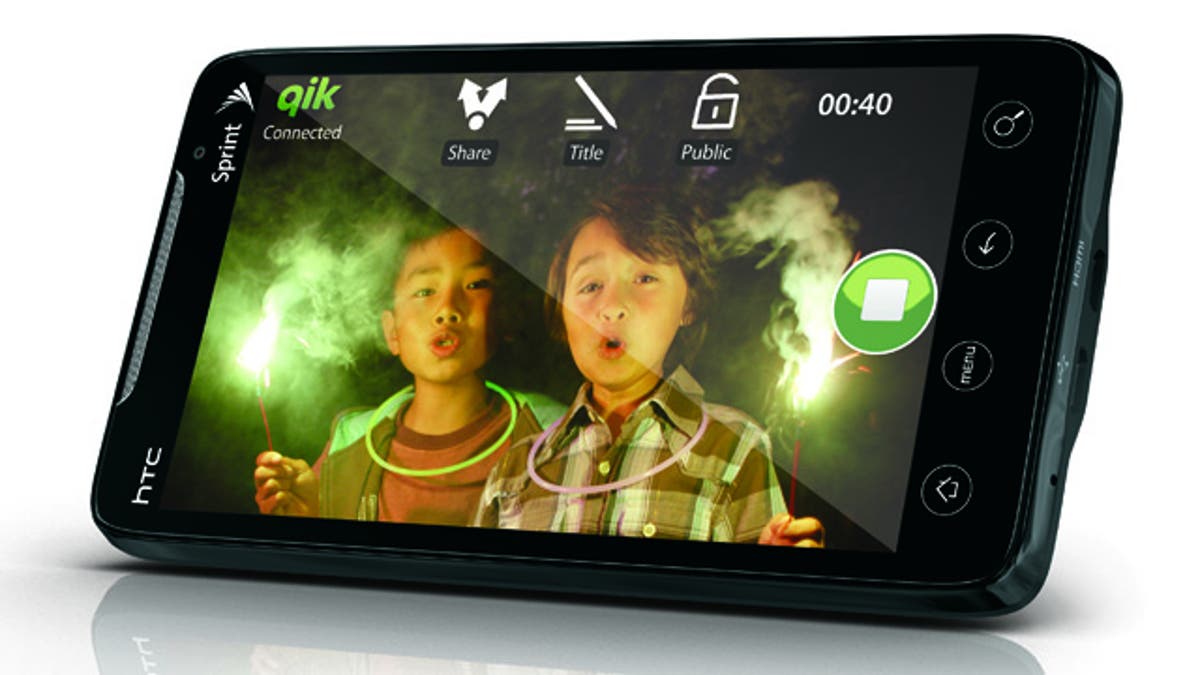
If you're looking to stream video or watch TV on a mobile phone, carriers argue that you'll want a phone that connects to the superfast "4G" network, such as Sprint's HTC Evo. (Sprint)
4G cometh, but do you wanteth?
This week, Sprint announced that it is expanding its nascent network of fourth generation (or "4G") high-speed cellular coverage to New York, Los Angeles and San Francisco. It already has 4G service in 55 other markets in 22 states, including cities such as Boston, Philadelphia and Dallas.
But do you want that -- or even need it?
"With 4G you can do all the things you can do on a Wi-Fi-enabled hot spot on your smartphone," Sprint spokesperson Kathleen Dunleavy told FoxNews.com. In theory, 4G service would work anywhere you can get cell reception -- meaning no more searching for a Wi-Fi connection in a coffee shop or airport waiting lounge.
Dunleavy noted the increasing popularity of downloading movies and making video, features that really require 4G speeds. Sprint's network can deliver average speeds of 3 to 6 megabits per second and peak downloads of about10 megabits per second -- that's faster than my home cable connection. It sounds great, and in my tests everything from maps and directions to Web pages popped up more quickly on a 4G cell phone than my now obsolete, ancient, six-month-old 3G phone.
While different 4G technologies are being deployed by competing wireless carriers, they all have the same goal: delivering broadband-speed connections to cell phones. Sprint was the first to offer 4G handsets this year. The company's new network is based on a standard called WiMax (for Worldwide Interoperability for Microwave Access). Verizon is rolling out 4G services shortly as well, but using a different -- and so far incompatible -- standard called LTE (for Long Term Evolution).
And there's the first catch.
That nasty word "incompatible" means that if you want 4G service, you'll need a new phone. Furthermore, because the carriers have chosen different standards, after you buy your new handset you'll be locked into their service -- unless you're willing to break the contract and buy yet another new phone.
The first two 4G phones are only from Sprint: the $200 HTC Evo and the $250 Samsung Epic. Both are based on the Google Android operating system and have dual cameras, front and back, so that you can make video calls using services such as Fring. And both are compatible with older 3G and the new 4G service.
The EVO has a giant 4.3-inch touch screen and even a little kickstand so you can set it down and watch TV shows and movies on it. The Samsung Epic has a smaller screen, but includes a slide out keypad for folks who find touch screens infuriating. Both are state of the art and great when it comes to juggling multiple apps, even if you never use 4G service.
And there's the next catch.
If you do want the speedy service, it's going to cost you: Sprint charges an additional $10 a month for 4G, even if you can't get it where you live or in many of the places you travel. And these phones can also double as mobile Wi-Fi hotspots, which is very handy, but it's another $30 a month. That brings the total cost of a full service plan up to roughly $140 a month. Ouch.
Sprint isn't the only one pushing 4G. MetroPCS also launched an LTE 4G service last month, but it has only one handset (the $299 Samsung Craft) and and three metro areas (Las Vegas, Dallas/Fort Worth, and Detroit) on that network so far. Verizon Wireless plans to debut its 4G network in 38 markets across the U.S. before the end of the year -- but only for wireless modems that you plug into a laptop. Compatible Verizon cell phones won't arrive until next year (a 4G Apple iPhone, perhaps?).
Meanwhile, many New Yorkers have already been toying with Sprint's 4G service for cell phones and modems, even though it doesn't officially launch in the Big Apple until November 1, followed by Los Angeles (December 1), and San Francisco (late December).
For business users who have to download PDFs and spreadsheets, 4G will no doubt be a boon. And if you're the type of person who wants to be the first to make a video call to your tech savvy friends, you'll want 4G, too. However, analysts at market research firm Gartner say 4G is one of the most over-hyped technologies this year, pegging it near the top of its annual "inflated expectations" chart.
In other words, the rest of us should wait until our cell phone contracts are up before we even think about 4G.
FoxNews.com's SciTech section is on Twitter! Follow us @fxnscitech.








































